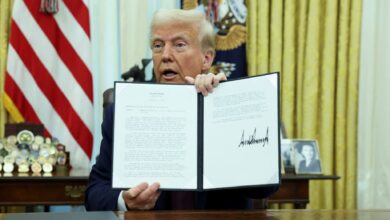Huawei and ByteDance Plan Major Tech Investments in Brazil, Raising US Concerns Over China’s Growing Digital Reach in Latin America
Huawei and ByteDance plan big tech investments in Brazil, sparking U.S. concerns over China’s growing digital influence.

(WE) — Chinese tech giants Huawei Technologies and ByteDance are preparing major investments in Brazil’s artificial intelligence and cloud computing sectors. These efforts will likely deepen concerns in Washington about China’s growing digital influence in Latin America.
On Monday, Brazilian outlet Folha de S. Paulo reported that Huawei plans to partner with Dataprev, the state-run company managing Brazil’s social data systems. The deal will give Huawei access to Dataprev’s data centers.
Huawei is also negotiating with Edge UOL, a cloud services company under Grupo UOL PagSeguro. Grupo UOL also owns Folha. These talks aim to expand Huawei’s role in Brazil’s cloud and AI landscape.
In May, Huawei executives met with Edge UOL leaders and Brazilian government officials in Dongguan, China. The delegation included Brazil’s secretary of digital governance, Ricardo Leite, and Mark Chen, Huawei Cloud’s Latin America president.
“We want to be the bridge between China and Latin America,” Chen said. He described Edge UOL as a “strategic service partner.”
Rodrigo Lobo, Edge UOL’s Chief Operating Officer, said the partnership will expand operations in AI, cybersecurity, and cloud infrastructure across Brazil.
The United States has warned Latin American nations about the risks of allowing Chinese firms to build critical tech infrastructure. US officials worry about potential data theft and surveillance. They also believe Beijing could use Chinese companies for strategic leverage.
Huawei remains on the US government’s trade blocklist. Officials accuse the company of maintaining ties with Chinese intelligence agencies. Similarly, ByteDance has faced scrutiny over concerns that its apps, including TikTok, track users and share data with the Chinese government.
Under China’s National Intelligence Law, companies must cooperate with state intelligence operations. This requirement applies regardless of where the data is stored, raising red flags in Washington.
Despite the warnings, Brazil follows a “strategic non-alignment” policy. The government is working to maintain strong ties with both the United States and China. It also prioritizes economic growth, digital inclusion, and affordable tech solutions.
Brazilian officials have declined to block Chinese tech companies. They point to development needs, competitive pricing, and energy efficiency as reasons for keeping these firms involved.
Brazil wants to become an AI hub powered by renewable energy. The country has not implemented investment screening measures similar to the Committee on Foreign Investment in the United States (CFIUS). This stance makes Brazil an attractive destination for foreign tech investments, including from China.
ByteDance is also planning a major move. The company is discussing new data center projects in Brazil, including one in the state of Ceará. The proposed site would use clean energy provided by Casa dos Ventos, a top renewable energy company.
The project would start with a 300-megawatt capacity. There is potential to triple that output. If completed, the site would become one of the largest AI and data processing facilities in Latin America.
These plans follow a cooperation agreement signed during Chinese President Xi Jinping’s 2023 visit to Brasília. The pact focuses on joint AI development, workforce training, and AI safety protocols.
Earlier this year, Brazilian President Luiz Inácio Lula da Silva traveled to Beijing for the China-CELAC Forum. During the trip, both countries discussed deepening AI cooperation and modernizing Brazil’s industrial sector.
Márcio Elias Rosa, executive secretary at Brazil’s Ministry of Industry and Trade, emphasized the importance of Chinese AI expertise. “We want Chinese AI tools on our factory floors,” he said. “They can boost productivity and make our industries more competitive.”
President Lula echoed this view. “Brazil wants everything China can share with us,” he said in Beijing. “And the correct word is ‘share.’ We need to learn to work together so these efforts bear the fruits we need.”
Cost and accessibility are key reasons for Brazil’s openness to Chinese technology. Huawei, for instance, offers advanced solutions at lower prices. These services are critical in rural areas that lack infrastructure.
Officials also cite Brazil’s clean energy grid as a strong advantage for AI development. Unlike in some regions, Brazil can power massive data centers sustainably. That makes the country a logical partner for Chinese firms focused on green innovation.
Read More:
- China’s Tianwen-2 Expected to Advance Cosmic Knowledge for Humanity
- Apple Watch and Apple TV Operating Systems to Receive Major Design Changes at WWDC Alongside iOS 19
- Samsung Unveils Galaxy S25 Edge: The Thinnest Galaxy Smartphone Yet Set for May 13 Reveal
But Washington sees Brazil’s openness as risky. US intelligence officials have said that letting Huawei or ByteDance operate cloud infrastructure could create long-term vulnerabilities. The concern isn’t just about today’s data — it’s about tomorrow’s digital power.
“These companies may seem private, but they’re accountable to Beijing,” one senior US official said earlier this year. “That makes them a strategic threat.”
Huawei has pushed back on these claims. The company insists it operates independently and follows local laws. ByteDance has also denied sharing data with the Chinese government.
Still, the political tension remains. And Brazil, for now, continues walking a fine line between the two superpowers.
Huawei’s data center plans with Dataprev would give it a deeper role in Brazil’s public digital infrastructure. Meanwhile, its partnership with Edge UOL could position the company to serve clients across healthcare, education, and government.
ByteDance’s proposed facility in Ceará could process huge volumes of data and AI models, enhancing TikTok’s regional performance and supporting other ByteDance ventures. It may also offer services to Brazilian firms in agriculture, logistics, and e-commerce.
The presence of these Chinese companies in Brazil goes beyond economics. It’s shaping how Brazil develops its digital policies and tools. Some experts warn that this influence may erode Brazil’s digital independence.
Others argue the collaboration brings needed investment and technical expertise. Latin American nations often lack the capital to build next-gen digital infrastructure on their own. For them, Chinese partnerships offer a way to compete globally.
The debate reflects a wider global divide. As the US and its allies adopt tighter controls over Chinese tech, developing countries face difficult choices. They must weigh economic benefits against security risks.
In Latin America, those decisions will shape the region’s future in the global tech ecosystem. Brazil stands at the center of that shift.
The next few months could be decisive. Huawei and ByteDance are expected to finalize their agreements soon. If approved, these deals could launch a new chapter of China’s digital expansion in the Western Hemisphere.
At the same time, pressure from Washington is expected to increase. The US may push Brazil and other countries to adopt stronger oversight of foreign tech companies. Whether those efforts succeed remains unclear.
For now, Brazil is betting on balanced diplomacy and open markets. Its leaders believe they can draw value from both sides without picking a side. Whether that strategy works in the long run — in tech, politics, or security — is still uncertain.















